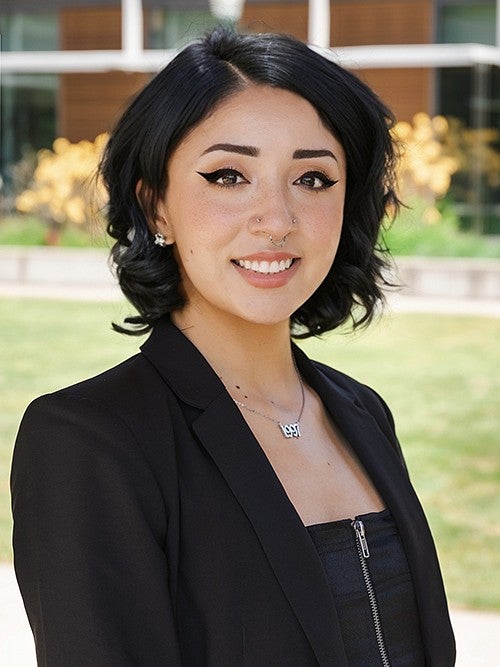
Learn more about Katie Alvarez, a student in the Early Intervention/Early Childhood Special Education program and the Special Education PhD program, through our Student Spotlight series.
"My professors always have thought-provoking questions and encourage us to be critical thinkers/practitioners in all aspects of our field." – Katie Alvarez
Meet Katie Alvarez, a current Early Childhood Special Education student. She has always loved working with kids of all ages, but was drawn to early childhood education because of the way she gets to interact and educate with play-based approaches. Katie has loved interacting with peers all over Oregon and has loved how supportive everyone is.
In the future, Katie hopes work in academia to prepare others intending to work in special education while also engaging in research with children with intellectual and developmental disabilities.
Quick Facts
Name: Katie Alvarez (she/they)
Favorite movies: Kill Bill (2003); Amélie (2001)
Previous Education: Bachelor’s in Psychology/Behavioral Neuroscience, Cornell College (2018); Master’s in Special Education (non-licensure), University of Oregon (2021)
Of the many career paths to pursue in education, what led you to choose early childhood education?
I have previously worked with kids of all ages (kindergarten to high school) but have always leaned toward working with the little kids. I love being a big goofball with them and playing pretend! I enjoy the play-based approaches in early childhood education--it feels very natural to me being in this environment. That being said, I am also working on my PhD in Special Education, so I do truly love working with kids of all ages.
What is unique about the Special Education program at the College of Education, specifically the EI/ECSE path for students?
The EI/ECSE program has a hybrid and in-person option, so it’s been great to interact from folks from all over Oregon and hear about their experiences.
How have your peers and your professors impacted your experience in the program?
My peers have been supportive of my success and from the beginning, I felt very comfortable around everyone in my classes! My professors always have thought provoking questions and encourage us to be critical thinkers/practitioners in all aspects of our field, which is an important practice for me, personally.
What are some of your future career goals?
In the future, I hope to work in academia to prepare others intending to work in special education while also engaging in research with children with intellectual and developmental disabilities. If I do not work in academia, I would love to work in early childhood special education consultation or as a specialist in an early childhood special education classroom.
